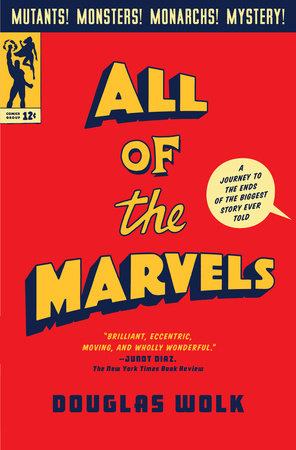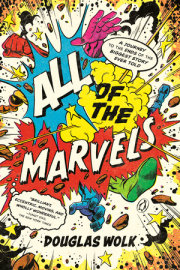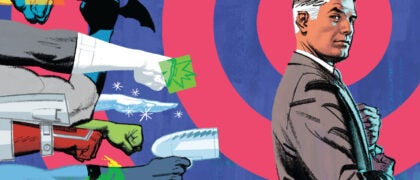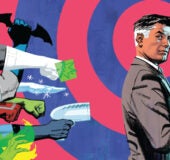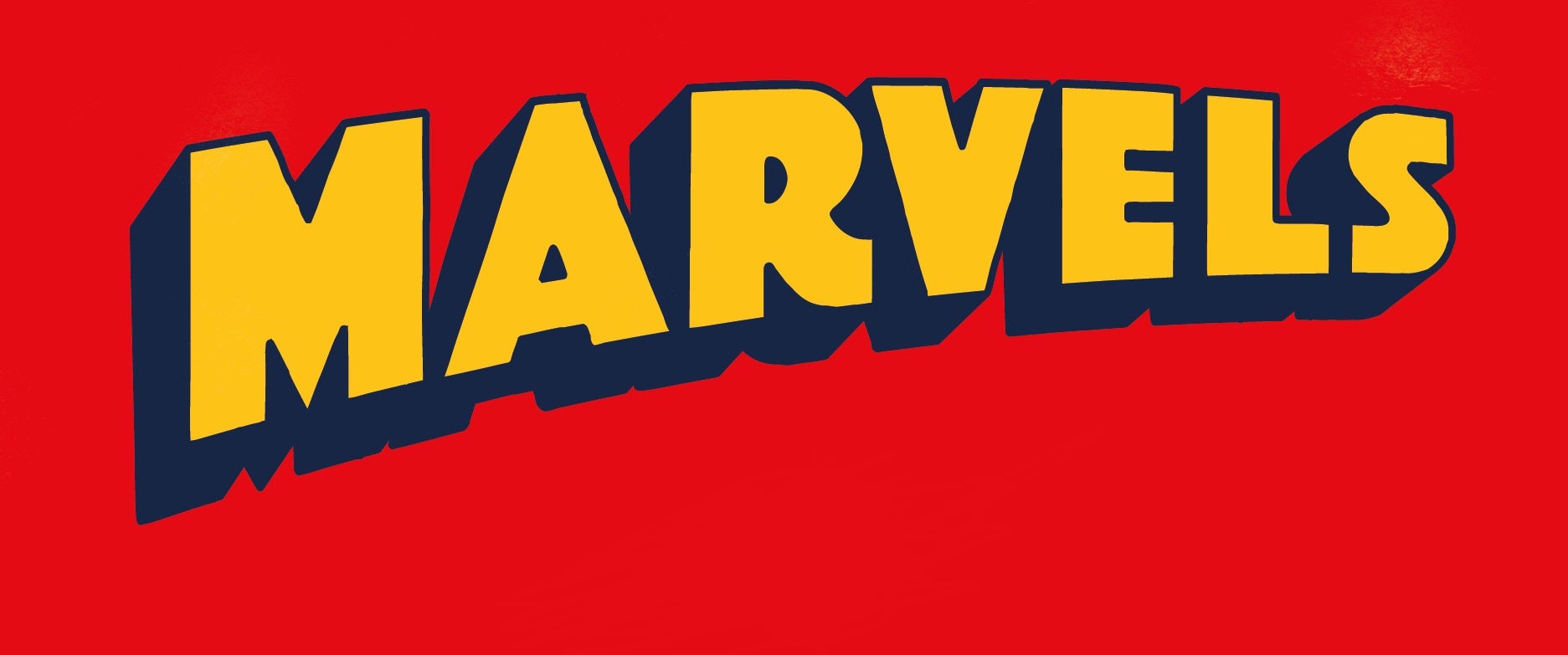The Mountain of Marvels
The twenty-seven thousand or so superhero comic books that Marvel Comics has published since 1961 are the longest continuous, self-contained work of fiction ever created: over half a million pages to date, and growing. Thousands of writers and artists have contributed to it. Every week, about twenty slim pamphlets of twenty or thirty pages apiece are added to the body of its single enormous story. By design, any of its episodes can build on the events of any that came before it, and they're all (more or less) consistent with one another.
Every schoolchild recognizes the Marvel story's protagonists: Spider-Man, the Incredible Hulk, the X-Men. Eighteen of the hundred highest-grossing movies of all time, from Avengers: Endgame and Black Panther down to Captain America: The Winter Soldier and Guardians of the Galaxy, are based on parts of the story, and it has profoundly influenced a lot of the rest: Star Wars and Avatar and The Matrix would be unimaginable without it.
Its characters and the images associated with them appear on T-shirts, travel pillows, dog leashes, pizza cutters, shampoo bottles, fishing gear, jigsaw puzzles, and bags of salad greens. (Some of the people who love the story also love to be reminded of it, or to associate themselves with particular characters from it.) Its catchphrases have seeped into standard usage: "Spidey-sense," "you wouldn't like me when I'm angry," "I say thee nay," "healing factor," "no-you move," "bitten by a radioactive spider," "puny humans," "threat or menace?," "true believers," "'nuff said." Parts of it have been adapted into serial TV dramas, animated cartoons, prose novels, picture books, video games, theme-park attractions, and a Broadway musical. For someone who lives in our society, having some familiarity with the Marvel story is useful in much the same way as, say, being familiar with the Bible is useful for someone who lives in a Judeo-Christian society: its iconography and influence are pervasive.
The Marvel story is a mountain, smack in the middle of contemporary culture. The mountain wasn't always there. At first, there was a little subterranean wonder in that spot, a cave that was rumored to have monsters inside it; colorful adventurers had once tested their skills there, and lovers met at its mouth. Then, in the 1960s, it started bulging up above the surface of the earth, and it never stopped growing.
It's not the kind of mountain whose face you can climb. It doesn't seem hazardous (and it isn't), but those who try to follow what appear to be direct trails to its summit find that it's grown higher every time they look up. The way to experience what the mountain has to offer is to go inside it and explore its innumerable bioluminescent caverns and twisty passageways; some of them lead to stunning vantage points onto the landscape that surrounds it.
There is no clear pathway into the mountain from the outside. Parts of it are abandoned and choked with cobwebs. Other parts are tedious, gruesome, ludicrous, infuriating. And yet people emerge from it all the time, gasping and cheering, telling one another about the marvels they've seen, then rushing back in for more.
Marvel Comics, as an artistic and commercial project, began in the early 1960s, initially as the work of a handful of experienced comics professionals-artists Jack Kirby and Steve Ditko, editor/writer Stan Lee, and a few others. The superhero stories that had dominated American comic books in the late Ô30s and early Ô40s had mostly fallen out of style at that point, but instead of returning to that faltering genre as it had been, Kirby, Ditko, and Lee combined it with aspects of the genres that had supplanted it: the uncanny horror of the monster and sci-fi stories Ditko and Kirby had been drawing more recently; the focus on the emotion of the romance anthologies Kirby had helped to invent in 1947; the gently jabbing wit of the humor titles Lee had been writing for many years. That hybrid formula-absorbing monster comics and romance comics and humor comics into superhero comics-turned out to be irresistible and durable. MarvelÕs early stories responded to the atmosphere of their historical moment, sometimes explicitly in their content and always implicitly in their themes.
Then Kirby, Lee, Ditko, and their collaborators figured out how to make the individual narrative melodies of all of their comics harmonize with one another, turning each episode into a component of a gigantic epic. That led to a vastly broader artistic collaboration: ever since then, its writers and artists have been elaborating on one another's visions, sometimes set in the same place and time but often separated by generations and continents.
The big Marvel story is a funhouse-mirror history of the past sixty years of American life, from the atomic night-terrors of the Cold War to the technocracy and pluralism of the present day-a boisterous, tragicomic, magnificently filigreed story about power and ethics, set in a world transformed by wonders. In some of its deeper caverns, it's the most forbidding, baffling, overwhelming work of art in existence. At its fringes, it's so easy to understand and enjoy that you can read a five-year-old an issue of The Unbeatable Squirrel Girl and she'll get it right away. And not even the people telling the story have read the whole thing.
That's fine. Nobody is supposed to read the whole thing. That's not how it's meant to be experienced.
So, of course, that's what I did. I read all 540,000-plus pages of the story published to date, from Alpha Flight to Omega the Unknown. Do I recommend anyone else do the same? God, no. Am I glad I did it? Absolutely.
I've spent some of my happiest days exploring the mountain of Marvels, and I wanted to get a better sense of what was in there so I could help curious travelers figure out how they might get inside it and how they might find the parts they'd like best. (I went all out so you don't have to; if you liked an Avengers movie and are interested in dipping a toe into its characters' comics, or read X-Men as a teenager and wonder what it's looked like since then, I'm here to help you have fun with that.) I also wanted to see what the Marvel narrative said as a single body of work: an epic among epics, Marcel Proust times Doris Lessing times Robert Altman to the power of the Mah‹bh‹rata.
As a cluster of overlapping serials, with dozens running in parallel at any given time, it has a different relationship with time and sequence than most kinds of narrative art have. It doesn't really have a beginning-well, it does, but since mid-1961, where the story began is not where any member of the audience has ever been meant to join it. Instead, the Marvel story gives the reader tools to figure out the context from any entry point, reading backward and sideways as well as forward. Each individual piece of it, on its own, is fun-engaging, exciting, pleasing to the eye-or, at least, meant to be fun. But there's another, different kind of fun that comes from piecing together the big story.
Marvel's narrative also has a peculiar relationship with authorship. Legally, its "maker" is a corporation, one that's gotten bigger over time as its body of intellectual property has changed hands. In practice, it was made by a specific group of people whose names we (mostly) know, and whose particular hands are (usually) unmistakable on any given page. But it's also almost always been created collaboratively: if you think any one person is the sole creator of a particular image or plot point, you're probably wrong, which is why it's a mistake to think of any one person who's worked on a Marvel comic book as its "author." On top of that, the nature of "continuity"-an important word in this context-is that every episode has to dovetail with (or at least not contradict) everything by other writers and artists that came before it or appears alongside it.
From a reader's perspective, though, that was one of Marvel's great innovations. You can follow any series on its own, without having to pay any mind to others; if you just want to see what Moon Knight's up to this month, you're good. But characters and plotlines bounce freely from one series to another, and events in any individual issue can have ramifications in any other, the same week or years later. Every little story is part of the big one, and potentially a crucial part.
That sense of shared experience, of seeing dozens of historical threads and dozens of creators' separate contributions being woven together, is a particular joy of following the Marvel Universe (with a capital U), as both the company and comics readers call it. The Marvel story is not the first or only one that works like that-DC Comics, Marvel's largest competitor, and other comics publishers have adopted the "universe" template too-but it's the largest of its kind.
It wasn't even meant to work that way, at first; it wasn't conceived organically in any way. The story has been driven, at every turn, by the dictates of the peculiar marketplace that sustains comics, and in recent decades by the much more profitable business of media and merchandise derived from stories that originated in comics. It grew accidentally, and it's accrued meaning accidentally, through its creators' memory lapses and misreadings and frantic attempts to meet deadlines. Even so, it's accrued a lot of meaning.
The Marvel story is about exploration-about seeing secret worlds within the world we know, and understanding possibilities of what we haven't yet experienced-and its parallel serials and wildly divergent creative perspectives even within a single serial make that broader understanding possible. It's high adventure, slapstick comedy, soap opera, blood-spattered horror, tender character study, and political allegory, usually all in the same week. It encompasses magnificent craft and dumb hackwork, and enduring the latter is sometimes helpful preparation for appreciating the former. It grew with its audience, and then grew beyond successive generations of its tellers. In form and substance, it's a tribute to the astonishing powers of human imagination and to the way that human imaginations in concert with one another can do far more than they could individually. It's a tale that never ends for any of its characters, even in death.
Those characters-and there are thousands of them-include some extraordinary ones, in whose fantastic excesses you, as a reader, might potentially see parts of yourself, or see what you might hope to become or fear becoming. On any page, you're likely to encounter someone like a computer science student who can talk to squirrels and is friends with an immortal, planet-devouring god; or an android who saved the world thirty-seven times, then moved to the suburbs of Washington, D.C., and built himself a family in a catastrophically failed attempt to be more human; or a vindictive, physically immense crimelord who has become the mayor of New York, and whose archenemy is the alter ego of the blind lawyer who serves as his deputy mayor; or a woman who discovered as a teenager that she could walk through walls, was briefly possessed by a version of herself from a dystopian future, trained as a ninja, later spent months trapped inside a gigantic bullet flying through the cosmos, and is now a pirate captain; or a tree creature from another planet who makes remarkably expressive use of his three-word vocabulary.
Marvel's shared-universe schema offers an exceptionally fun way of thinking about ethical behavior that's more complicated than "good guys and bad guys." The story's alliterative heroes, from Peter Parker to Miles Morales to Jessica Jones to Kamala Khan, rarely come into their power willingly; their abilities are less often something they've achieved than an unanticipated burden. Its villains are rarely beyond redemption, and are as likely as not to become its heroes or even its saviors. Even the worst of them have their reasons.
Over the course of six decades, the story has developed its own bizarre, sort-of-coherent cosmology. Marvel's Earth is the center of its universe, the most important place in all of creation. It's also "Earth-616," only one of many possible versions of the world that appear within the story. A former surgeon, who lives in a Greenwich Village town house with the ghost of his dog, perpetually defends the planet against occult attack and has seen it destroyed and rebuilt, good as new, more than once. The nexus of all of its realities is deep within a swamp in the Florida Everglades, guarded by a monster who can't abide fear. An ancient being who lived in an oxygenated zone of the moon witnessed all of the alternate possibilities for how its important events might have turned out, until he was murdered and his eyes stolen. The throne of the Marvel Universe's Hell is empty; its Norse pantheon's home once crash-landed in Oklahoma.
Some of the questions the Marvel story asks and (the short versions of) the answers it offers:
What do gods do? (They create; they judge; they destroy.)
What do monarchs do? (They protect their nations, even when that makes them monstrous.)
Is there anything beyond the world we know? (There is more than we could ever possibly imagine.)
What happens when we grow up? (We may try to put away childish things, but we can't, or shouldn't. The best thing that can happen is that we turn those things into something bigger and more beautiful.)
More than anything else, though, the Marvel world is a place of scientific miracles and of technological progress that transforms the lives of everyone within it. Its most prominent and most fallible champions are the ones with doctorates. The telling of the Marvel story begins with a rocket flight gone wrong; the main engine of its American century is a race for technology to create the perfect soldier; its chief exponents of terror are a cult of scientists hoping to strike blows against corporate control. Some of its best-loved characters are "children of the atom," the next step in evolution, sparked by the nuclear age. Earth-616 is recognizably our world, made stranger and richer by wonders of science-a world in which deep knowledge has always been a shield against incomprehensible horrors.
I wanted to gain deep knowledge of the story itself-to learn all there is to know about it-and I dedicated a couple of years of my life to that effort. But Marvel has also published a lot of stuff that isn't part of that story, by some definition, and I had to draw the line somewhere. I came up with three questions to narrow down what I would obligate myself to read:
Copyright © 2021 by Douglas Wolk. All rights reserved. No part of this excerpt may be reproduced or reprinted without permission in writing from the publisher.

